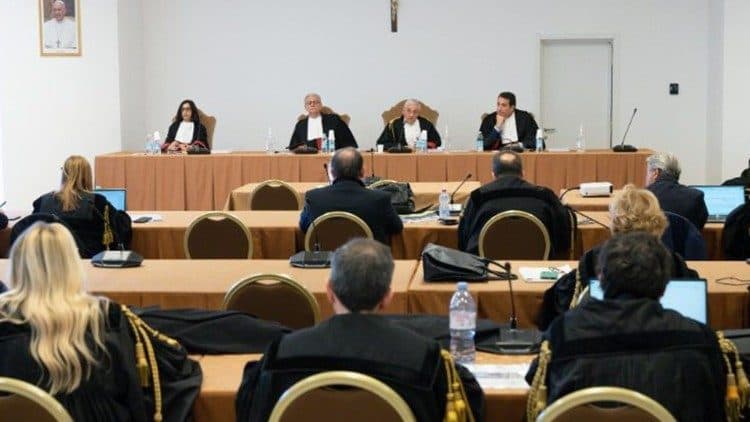ROME – A panel of Vatican judges overseeing the trial of ten defendants for extortion and other financial crimes, dubbed the Vatican’s “trial of the century,” heard Wednesday from a lawyer representing the Vatican bank who complained that the accused had treated the bank “like a cash machine, which always had to respond positively to their requests.”
Those defendants include Italian Cardinal Angelo Becciu, a former papal chief of staff, and the first cardinal ever to face a criminal trial before a Vatican tribunal.
Attorney Roberto Lipari, representing the Institute for the Works of Religion, better known as the “Vatican bank,” echoed the request made in July by Vatican prosecutor Alessandro Diddi for the defendants to be convicted, and also asked that they be compelled to pay the bank roughly $1 million for “moral and reputational damage.”
It was a complaint to Vatican prosecutors from bank officials which initiated an investigation that led to criminal charges against the ten defendants in July 2021.
Lipari asserted that the defendants should be compelled to refund roughly $735 million which, he said, the Vatican bank had provided to the pope for the needs of the Church, and which, he said, instead were squandered through illicit “speculative investments.”
Referring to the period in 2013-2014 when the Vatican’s Secretariat of State began its controversial $400 million purchase of a former Harrod’s warehouse in London, Lipari painted a picture of a system of financial administration in the Secretariat of State without adequate controls or oversight, and thus ripe for fraud.
“In this trial, we’ve seen attempts at personal enrichment, oil extraction projects in Angola, the use of financial instruments in which the administrator of ecclesiastical assets lost all possibility of control, and the use of Church money without any control or accuracy,” Lipari said.
“It was all managed in a self-referential way by a monsignor who’s an expert in canon law, and an accountant with no experience in financial investments,” he said. “We’ve seen the use of money without due diligence, extortion and blackmail, insiders who sympathized with the blackmailers, [and] huge economic resources managed without taking into account the constraints imposed by the donors.”
Lipari was especially critical of the proposed project in Angola, which was considered on Becciu’s watch but ultimately never realized.
The very fact it was ever contemplated, Lipari argued, demonstrates a failure of oversight, given that it risked “damages to the environment,” and also “the fact it was a country accused of a lack of respect for human rights, and also the presumed ties with Falcon Oil and a French arms dealer, Pierre Falcone.”
Falcone, 69, is a French businessman who was arrested and initially convicted by a French court in 2009 for his role in allegedly illegal arms sales to Angola in the 1990s, though his conviction was later overturned on appeal.
In addition to the Secretariat of State, Lipari was also critical of the Vatican’s Financial Information Authority (today the “Supervisory and Financial Information Authority”), a watchdog body created under Pope Benedict XVI, which had signed off on the London deal. The former president of the authority, Swiss lawyer René Brühlart, and his deputy, Italian lawyer Tommaso Di Ruzza, are among the defendants in the trial.
According to Lipari, Brühlart and Di Ruzza “not only broke the law, but they subverted their role, they subverted the public function of the Financial Information Authority for an illicit end,” and, in so doing, “brought the Vatican’s financial system to ridicule.”
Despite the seemingly damning character of Lipari’s presentation, some commentators remained unconvinced. The Italian online news agency Faro di Roma, which has defended Becciu on multiple occasions, carried an essay accusing Lipari of “delirium,” since he based his indictment on part on a deal in Angola that never actually happened.
“In sum, the trial continues in its usual way: In every hearing, things proceed with a few steps into delirium, without any concern for the moral suffering inflicted on innocent people and, ultimately, on the Church,” the essay concluded.
Today, the judges in the case are scheduled to hear from lawyers representing another of the civil parties to the case, the Secretariat of State, and Friday it will be attorneys representing the Administration of the Patrimony of the Apostolic See (APSA).
Defense lawyers will have their turn beginning Oct. 5, the day after Pope Francis’s Synod of Bishops on Synodality opens.













